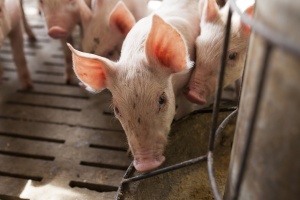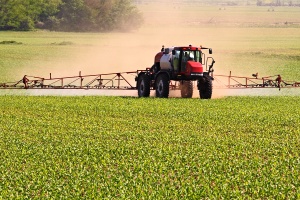A farm mom’s take on mindful eating
“Mindful eating” has become an increasingly popular concept, one that’s also highlighted as a 2021 wellness trend. Mindful eating habits encompass many things: listening to your body for fullness signals, slowing down, eating with others. It also focuses on considering where food comes from. So, as a farmer, wife and mom, we asked Emily Reuschel to share her take on mindful eating.
Q: Tell us a little bit about your family and farm.
A: My husband, Andrew, and I are part of his family’s farm in West Central Illinois. Andrew farms with his dad Jeff. His mom Teri holds us all together (like most farm moms do). Andrew and I are raising the sixth generation – our two kids Everett and Alyda – on our farm. Reuschel Farms grows about 1,500 acres of corn and soybeans, most of which are century farms or family farmland.
I wasn’t raised in agriculture. I grew up in what I thought was a “small” town outside St. Louis. Then, Andrew swept me off my feet and away to an actual small town. So, agriculture and farming are something I’ve had to learn by asking a lot of questions along the way. Understanding what it takes to farm has informed my own perspective on what it means to eat more mindfully. Today, I’m a Senior Program Director at our local YMCA where I lead a team to provide childcare and youth programming to our rural community. Over the past year, I’ve also started teaching HIIT and strength training classes for women at our Y.
Q: What does mindful eating look like in your house?
A: Over the past 17 months, I’ve been on my own health journey, and I’ve really learned what it means to eat mindfully, fuel my body well and truly listen to what it’s saying. When it comes to things like organic or non-organic, we try to look beyond the labels and focus on ingredient and nutrition information. Though busy farm seasons like planting and harvest create odd working hours, we still commit to eating as a family as much as possible, even if that means loading up and catching dinner together field-side in the back of the minivan. The rest of the year, we are sitting down to a healthy dinner together every night without question.
Having said that, my kids certainly devour their fair share of Oreos and Cheetos. It’s all about balance.
Q: Part of mindful eating is considering everything it took to bring food to the table. What would you like others to know about your farm and how you’re contributing to their food?
A: Corn and soybeans are a cash crop, a commodity. Meaning, it’s not a crop we’d sell directly to you. Instead, the corn and soybeans we harvest head down the river for a variety of uses, or are ground into feed for local cattle, pigs, and chickens. While we don’t raise the animals directly that end up as high-value protein, our job is to take care of the land so that healthy soils can grow healthy crops that are fed to livestock.
Just like you might be working to be more mindful about how you eat, we try to be more mindful about how we farm. My husband is a cover crop (more on that in a bit) and soil health enthusiast and takes very serious how he cares for our land.
Cover crops are planted after our fall crops (corn and soybeans) are harvested. The cover crop then provides a “blanket” for the soil, preventing soil erosion from wind and precipitation during the winter months. We also practice no-till, which means that instead of turning over the ground before planting, we leave last season’s residue (corn stalks, etc.) on top and plant directly into it. We’ve found that this helps protect against erosion and maintains the soil’s organic matter – all the important nutrients and soil organisms needed for growing a healthy crop.
I can’t trace an exact ear of corn or soybean pod that would come from one of our fields to what you had for breakfast this morning, but that doesn’t change our farm’s commitment to providing high-quality food for our family and yours.
At the same time, we’re also working toward a vision to diversify our farm in a way that will allow us to connect our food more directly with customers. In 2019, we started raising chickens for eggs and added a flock of broiler (meat) chickens last summer. We’ll also be converting some land around our house to grow sunflowers, zinnias, and other flowers that people can come and pick themselves. We look forward to making these more personal connections to our food in our local economy.
Q: How has your role on the farm impacted your perspective in health and wellness?
A: I’m starting to understand that the quality of the foods we eat are very much a direct result of the health of our soil. Our foods are the building blocks of our bodies – the way food makes us feel, and how it fuels us to perform and show up for the kind of life we want to live. That starts with farm families committed to producing high-quality food, and I’m proud to be one of them.










0 Comments